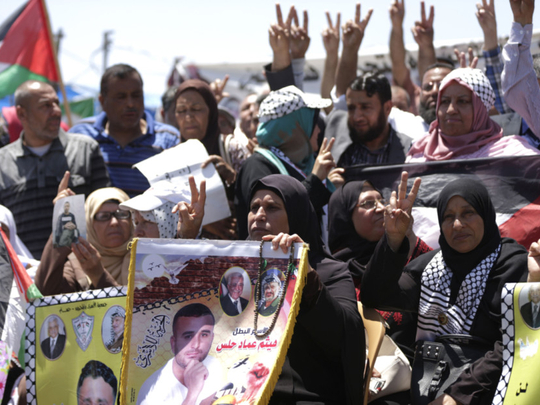
The plight of Palestinian prisoners on hunger strike in Israeli jails for 41 days may have ended as, reportedly, they ended their protest after Israel agreed to some of their demands, wrote the Jordan Times. “After repeated vows by Israeli authorities not to negotiate with the jailed Palestinians, and after 20 hours of talks between Israeli officials and Barghouthi, it was reported that the Palestinians will stop the protest. Israelis insist the deal was reached not with prisoners’ representative, but with the Palestinian National Authority and the International Committee of the Red Cross (ICRC). Israel was stubbornly clinging to its position. Apparently, however, there was pressure from ICRC, whose doctors visiting the prisoners warned about ‘potential irreversible health consequences’. The approaching date marking 50 year of occupation made Israelis see the danger of ignoring the suffering of jailed Palestinians and concede to one of their main demands: Two family visits a month instead of one before.”
The hunger strike by Palestinian prisoners was a decisive battle and a milestone in the history of the Palestinian prisoners’ movement, said Qatar’s Al Raya. “After 41 days, the prisoners’ claimed their victory in this battle for freedom and dignity, which in turn represents the defeat of the Occupation before the determination and unwavering stand of Palestinians in Israeli prisons. This victory is also a message to the entire state of Palestine: That the Palestinians are able to build on these factors of strength to accomplish more achievements and wins against the Occupation through unity and national cohesion. The Palestinians have to realise that the victory of the Palestinian prisoners is source of power to continue their efforts to unify their ranks and face Israeli projects that target their national issue.”
Regarding the terrorist attack in Egypt, Lebanon’s Daily Star said that last Friday’s attack against the Copts is just another in a series that has indiscriminately claimed both Muslim and Christian casualties.
“Friday’s carnage also highlights the serious gaps in security, irrespective of the tough talk by the government, notwithstanding that Egypt suffers from unchecked borders with many unstable countries such as Libya, which extremists, exploiting the chaos that ensued following the ousting of Muammar Gaddafi, have treated as a breeding ground for militants. The 28 victims in the Minya massacre are no less important than the 22 that suffered the same atrocity in Manchester, and deserve the same international outcry and condemnation with a genuine promise of a collective effort to combat such acts. Mere statements and condemnations are futile and have become routine and redundant. What we need are vigorous and relentless measures to stop terrorism in its tracks.”
The attack by the gunmen of Daesh (the self-proclaimed Islamic State of Iraq and the Levant) on a bus carrying Coptic Christians in central Egypt was the second terrorist attack in the world since the Arab-Islamic-American summit in Riyadh, noted the Saudi Gazette. “The Minya attack came on the heels of the Manchester concert bombing that killed 22 people and injured dozens more. So in just five days following the summit, two major terrorist attacks were launched by the same group in two countries on two continents. That is not a coincidence, but a direct reply to the summit’s centre-piece address that urged Muslim-majority countries to redouble their counter-terrorism efforts. Saturday was the start of Ramadan, a time when 1.8 billion Muslims around the world reject violence and seek to pursue peace. Sadly, the 30-day period of fasting and reflection in the Islamic world has in recent years seen an increase in terror attacks as Daesh exhorts its followers to rise up in an ‘all-out war’ ...,” the paper said.





_resources1_16a31069e4e_small.jpg)





